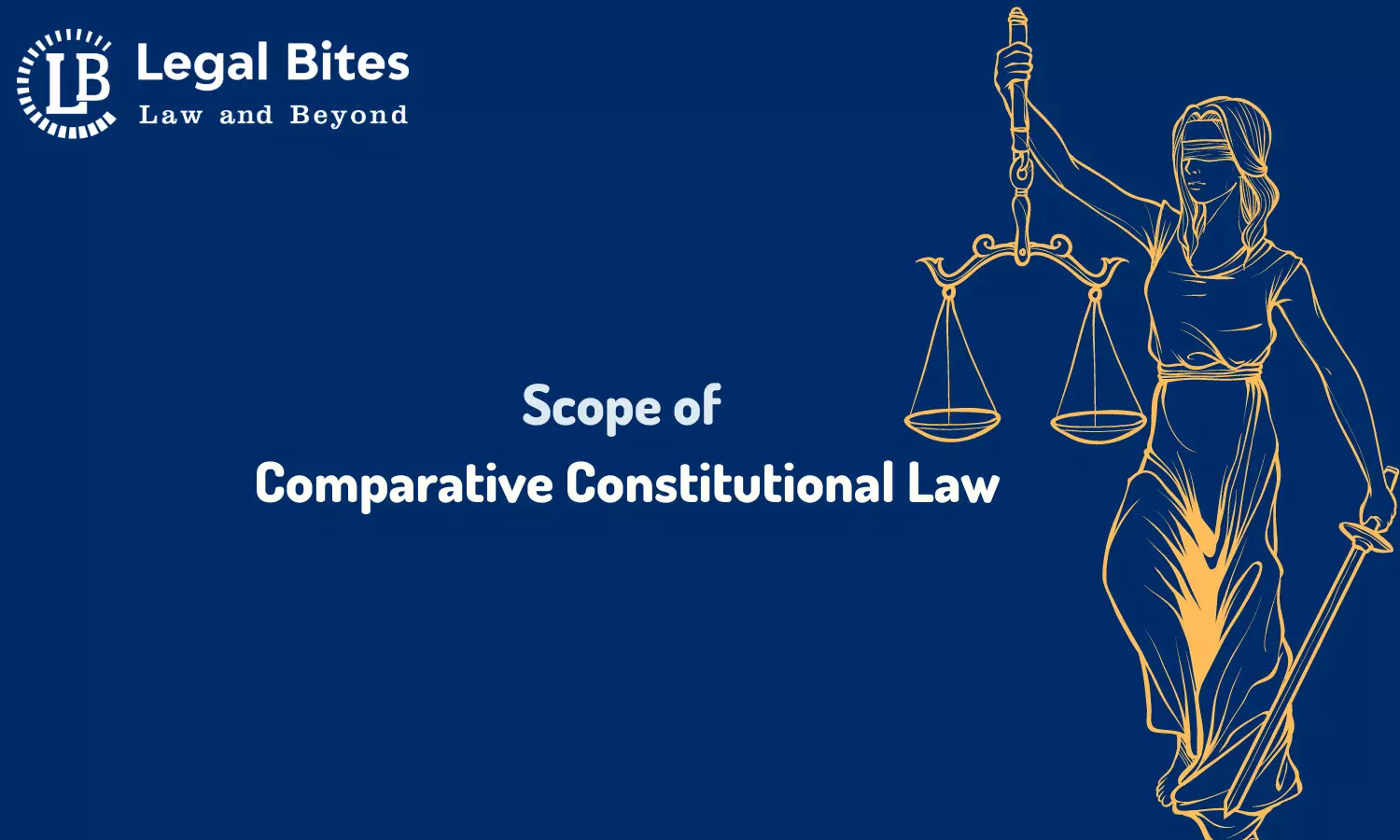Scope of Comparative Constitutional Law
The article 'Scope of Comparative Constitutional Law' delves into the subject of comparative constitutional law, providing insights into its historical origins, benefits and scope.

The article 'Scope of Comparative Constitutional Law' delves into the subject of comparative constitutional law, providing insights into its historical origins, benefits and scope. By doing so, the author tries to articulate the advantages associated with studying this branch of law.
By exploring a wide range of constitutional systems and their experiences, comparative constitutional law provides insights into best practices, potential pitfalls, and innovative solutions to constitutional challenges. It contributes to the advancement of constitutional theory, the development of constitutional norms, and the promotion of democratic governance and human rights globally.
Introduction
Since the scope of human existence is no longer constrained by national sub-divisions but is instead as wide and unencumbered as the horizon, the demand for a comparative method of research has become necessary in any study of human culture, achievements, and institutions. The comparative method helps comprehend one country's system with another country's systems. It offers insight into a range of political, economic, cultural, social, and historical elements, paving the way for easier discussion of trade relations or diplomatic relations with other countries. Additionally, it evaluates the degree of systemic harmony at both the international and national levels.
Never in the past, has there been such a need for comparative legal analysis from courts, lawyers, and constitution-makers in a variety of nations, and never before has the field been so established, with new regional and international associations facilitating the sharing of ideas and the planning of collaborative endeavours?
History of Comparative Law
It is unclear when comparative law first emerged because it was used in numerous legal systems long before the term "comparative law" was coined. For instance, the method has a long history in Russian law, dating to the fifteenth century. Although the approach has been around for a while, comparative law was first described by an English author, Bacon, in the seventeenth century. As a result, it appears that Rome and England were the first to adopt modern comparative law.
Montesquieu is regarded as the "Father of Comparative Law" since he used the comparative methodology in his book “De l'esprit des lois”. He analyzed the penalties imposed in France and England to compare their penal codes. Due to the development of international trade and commerce during the 20th century, the concept gained popularity and people started adopting the same. As a result, several new variables were developed for such comparative analysis. Comparative law has become more sophisticated in the twenty-first century. The study of the comparison of cultures, public international law, legal traditions, and diplomacy are considered a new dimension.
Scope and Purpose of Comparative Constitutional Law
Comparative Constitutional Law is a thorough academic study of several constitutions, each of which is dissected into its constituent parts to determine how they differ in various legal systems and how their parts might be brought together to form a system. Studies of comparative constitutional law can be divided into two categories: macro comparative constitutional analysis and micro comparative constitutional analysis. Micro comparative constitutional analysis refers to detailed comparisons of the constitutions of two countries and Macro comparative constitutional analysis refers to broad-ranging studies of several countries.
Comparative constitutional law examines how distinct constitutional concepts are arranged, construed, and applied in diverse systems or nations. Currently, it appears that the main goals of comparative constitutional law are to gain a deeper understanding of the current constitutions of the many countries, to enhance the application of constitutional concepts to the current legal systems, and to assist in the unification of correct constitutional existence on a smaller or greater scale in every country.
Therefore, to be specific, the purpose of comparative constitutional law is as follows:
- It helps in evaluating a better law among different legal systems.
- It helps the students and professionals to gain a significant amount of knowledge.
- It helps the legal system to substantiate the application of the law.
- It helps in building an analytical and comprehensive method of study in law schools so that the students can apply a broader approach while applying their minds to law.
Benefits of Comparative Constitutional Law
Comparative constitutional laws, as understood above, help in conducting a fair, unbiased and pragmatic comparison between the constitutional approaches as adopted by different countries. While we are aware that many aspects of the Indian constitution have already been adopted from other countries best practices and refurbished by our country’s needs, it still becomes important to make note of how the countries are evolving about their democratic setup and the constitutional framework with the world moving ahead at a such fast pace.
Comparative constitutional law creates a distinction yet assists in decoding how different countries adhere to their constitutional norms. This area of study has thereby created a lot of interest in judges and the whole legal fraternity, scholars and researchers, for it becomes viable to minutely observe to adjudge whether a country can keep pace with the evolving standards or not.
One of the popular cases in this regard is Lawrence v. Texas, 539 U.S. 558 (2003), Justice Kennedy cited Dudgeon v. United Kingdom, 45 Eur. Ct. H.R. (1981), a decision which was passed by the European Court of Human Rights striking down legal provisions that prescribed consensual homosexual conduct in Northern Ireland, as persuasive authority for the point that Western civilization has come to view anti-sodomy laws as mere prejudice and a violation of the rights of a politically unpopular group.
Comparative legal study in totality helps in doing the same as has been discussed above. For instance, the recent same-sex marriage debate and judicial proceedings going on in India present an opportunity for judges to delve into the pronouncements of other jurisdictions to make sense of how the same decision was made by those other countries. While it is true that each country has to give regard to its own set of cultural and moral values, it becomes a rich observation, once a reference is taken from the intellect as applied to the same subject matter elsewhere.
This can be applied to the case of comparative ‘constitutional’ law as well where the idea is to attempt and decode the technique or knowing about legal systems and the actions taken by other countries for issues that are rather common and global. This thereby, enunciates the importance and rather benefits of comparative constitutional law.
Conclusion
The finest legal theories consist of simple concepts and in-depth justifications for empirical events. Comparative Constitutional Laws may be the most effective way to achieve this. It is believed that the vast majority of excellent comparative public-law scholarship published over the past ten years has made a significant contribution to the connecting and classification of the new constitutionalism world as well as the development of suitable notional structures for a more thorough study of comparative constitutional laws. In other words, Comparative Constitutional Laws have advanced due to the global dissemination of ideas and the same have the potential to further assist all the countries to learn from each other’s good practices.
References
[1] Pratibha Kumari, Comparative Constitutional Law and its Applicability in International Law, Available Here
[2] Donald P. Kommers, Comparative Constitutional Law: Casebooks for a Developing Discipline, Available Here
[3] Vishruti Chauhan, Importance of Comparative Legal Studies, Available Here
[4] Antonia Baraggia, Challenges in Comparative Constitutional Law Studies: Between Globalization and Constitutional Tradition. Special Issue - Comparative Law, Available Here
[5] Sharabana Chattopadhyay, Scope of Comparative Constitutional Law In Legal Studies, Available Here


